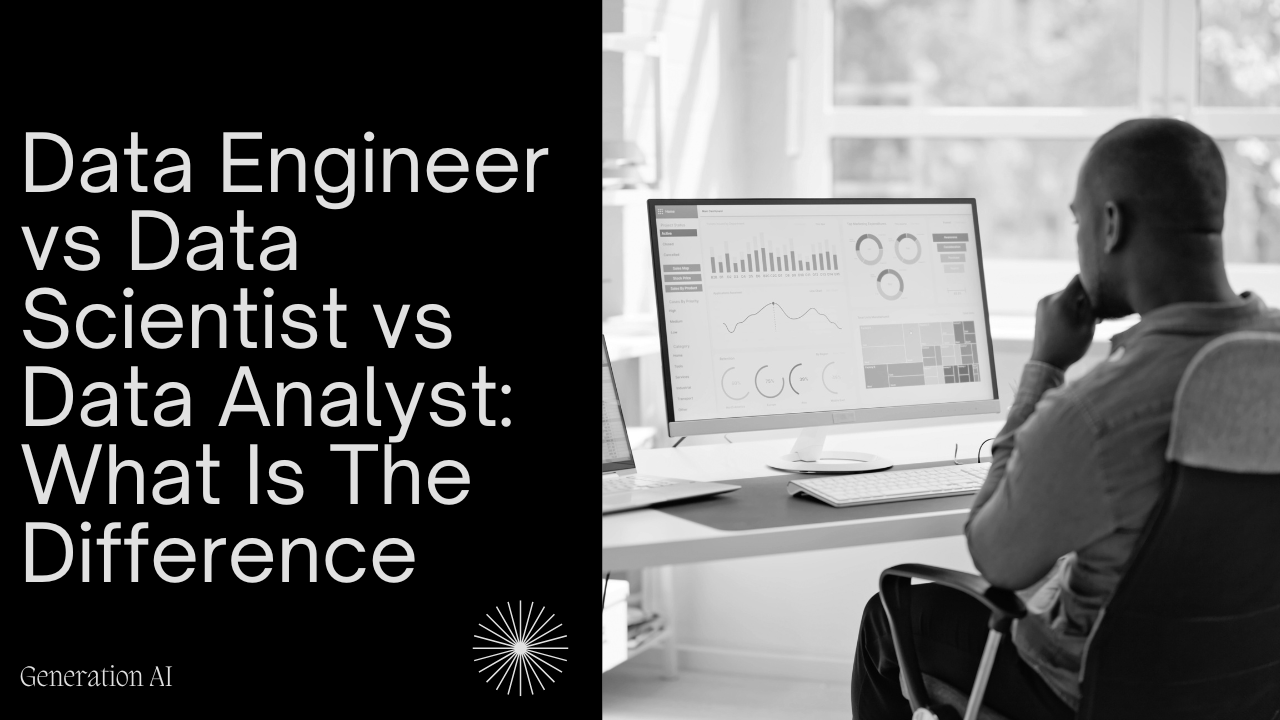Hiring the right data professional is crucial. It can transform your business, driving innovation and growth.
But making your first data hire can be daunting.
You may be unsure about the different data roles. Or uncertain about the skills and qualifications to look for.
This guide is here to help.
It will demystify the process of hiring a data professional. Whether you’re looking to hire a data scientist, a machine learning engineer, an AI engineer, or a data engineer, this guide has you covered.
So, whether you’re a business owner, a startup founder, an HR professional, or a team leader, this guide is for you.
Let’s start!
Understanding the Different Data Roles
Understanding the distinct roles in data can guide your hiring process. Each role brings unique skills and strengths to your team.
Data professionals specialize in various areas. Knowing the specifics can clarify who you need for the job.
Here are some key data roles to consider:
- Data Scientist: Extracts insights from complex datasets.
- Machine Learning Engineer: Builds algorithms for predictive models.
- AI Engineer: Develops intelligent systems with AI techniques.
- Data Engineer: Manages and optimizes data pipelines.
A data scientist focuses on data exploration and analysis. They help your company by uncovering patterns and trends. This can steer your strategic decisions and provide a competitive edge.
Machine learning engineers create models that learn from data. These models forecast future trends, enhancing business operations and services. They help automate tasks and improve efficiency.
AI engineers craft advanced systems using AI methods. These systems mimic human intelligence and solve complex problems. Implementing such technology can lead to innovative solutions and new business opportunities.
Data engineers are the backbone of your data operations. They ensure data is available, accurate, and secure. By designing robust data architecture, they enable seamless access for all your data needs.
Each role has distinct responsibilities but shares one goal: harnessing data effectively. Matching the right role with your company’s needs is crucial. This ensures your first data hire aligns with your business objectives and drives meaningful outcomes.
The Importance of Data-Driven Decision-Making
Data-driven decision-making is vital for modern companies. It shifts decisions from gut feelings to data-backed insights. This transition leads to better and more reliable outcomes.
By analyzing data, businesses understand consumer behavior more precisely. It reveals patterns and preferences that were previously hidden. With this knowledge, companies can tailor their strategies to better meet customer needs.
Additionally, data helps identify areas for improvement. It uncovers inefficiencies and highlights where resources may be wasted. Addressing these issues can streamline operations and boost profitability.
Furthermore, using data empowers companies to predict future trends. Anticipating market changes allows organizations to prepare and adapt. This proactive approach fosters resilience and long-term success. Embracing data-driven strategies also encourages transparency and accountability. Decisions are based on facts, which can be validated and checked. As a result, teams work with a clear sense of purpose and direction.

How to Identify Your Company’s Data Needs
Before making your first data hire, it is crucial to identify your company’s specific data needs. Each company has unique objectives, and understanding these will guide your hiring process. Start by evaluating your current data capabilities and challenges.
Consider the business questions you aim to answer with data. Are you looking to optimize operations, enhance customer experience, or drive innovation? Your data hire should align with these goals to provide meaningful insights.
Another important factor is the type of data you collect and manage. Determine whether your data is structured, unstructured, or a combination. This will influence the skills and expertise you require in a candidate.
Next, assess the tools and technologies you use. Are you leveraging big data platforms, predictive analytics, or visualization tools? Ensure your data professional is skilled in these areas, as this will enhance their effectiveness.
To help pinpoint your needs, develop a list of questions:
- What are our primary data challenges?
- What insights do we want to gain?
- How mature is our data infrastructure?
- What tools are currently in use?
- What future data initiatives are planned?
Answering these questions will give you clarity. It will help you define the role that best fits your needs, whether it’s a data scientist, data engineer, or another specialist. This process ensures you hire a professional who can drive value and support your data strategy effectively.
How to Craft a Compelling Job Description for Data Roles
Creating a well-defined job description is a pivotal step in attracting top data talent. A clear and engaging description not only outlines the role but also sets expectations for both the employer and the candidate. It acts as the first impression of your company.
Begin with a captivating job title. The title should clearly reflect the role you are hiring for, such as “Data Scientist” or “Machine Learning Engineer.” Avoid using obscure or generic titles that might confuse applicants.
Next, provide a succinct summary of your company and its data goals. This section should convey what sets your organization apart and why a potential candidate should be interested in joining your team. Highlighting your company’s commitment to data-driven strategies can be a strong selling point.
Clearly list the primary responsibilities of the role. Detail the tasks your hire will undertake daily. This might include data analysis, model development, or reporting. Be precise and highlight the impact these tasks have on achieving business goals.
Outline the required qualifications and skills. This includes both technical skills, such as proficiency in Python or SQL, and soft skills like communication and teamwork. Use bullet points for clarity:
- Proficiency in data analysis tools (e.g., Python, R)
- Strong problem-solving and analytical skills
- Ability to communicate complex findings to non-technical stakeholders
- Experience with data visualization tools like Tableau or Power BI
Highlight the benefits and opportunities that come with the role. Include information about professional growth, training, and any unique perks your company offers. This section can sway undecided candidates by showing the long-term value of joining your team.
Finally, emphasize your company’s culture and values. Prospective candidates seek workplaces where they can thrive and align with their personal and professional values. Including cultural fit can attract the right talent who will integrate well with your team.
Qualifications and Skills to Look for in a Data Professional
When hiring your first data professional, understanding key qualifications and skills is essential. It ensures you select a candidate who can effectively contribute to your data-driven initiatives.
Let’s explore what to prioritize:
- Proficiency in programming languages like Python, R, or similar languages is crucial for data analysis and developing algorithms that drive insights from data.
- A strong grasp of statistics and mathematics is vital, enabling professionals to interpret data and build predictive models accurately.
- Experience with data visualization tools, such as Tableau, Power BI, or D3.js, is highly valuable for conveying complex data findings in a digestible format, especially for non-technical stakeholders.
- Advanced knowledge of SQL and database management is essential, as this ensures efficient data retrieval, especially when working with tools like Redshift or Snowflake.
- Familiarity with ETL processes and tools like dbt allows candidates to manage data workflows effectively.
- Knowledge of real-time data processing with Spark can significantly enhance data operations.
- Proven problem-solving abilities and critical thinking skills are necessary to analyze complex situations and propose data-driven solutions that align with business objectives.
- Excellent communication and collaboration skills are a must, as these professionals will need to work seamlessly across teams, explaining technical details in an understandable way.
- Familiarity with GitHub for version control and managing data codebases is a bonus.
- The ability to work with spreadsheets in Excel and interpret data from various sources ensures versatility in handling diverse data tasks.
These qualifications ensure your first data hire will not only meet the technical demands of the role but also integrate smoothly into your organizational culture, enhancing your data-driven strategies.
This is especially important for hiring managers and CTOs looking for full-time team members.
Sourcing and Assessing Data Talent
Finding the right data talent can seem overwhelming, but structured strategies can simplify the process. Being proactive and intentional is key to success.
Start by clearly defining the role you need. A well-outlined role attracts suitable candidates. Highlight specific skills, qualifications, and responsibilities in your job postings.
Consider diverse sourcing channels to find talent. Traditional job boards are useful, but think beyond them. Leverage networking events or professional groups where data professionals gather.
Don’t overlook referrals from your existing network. Trusted recommendations can lead to high-quality candidates. Encourage your current employees to refer potential hires.
It’s also crucial to assess the qualifications of candidates. Begin with their educational background and professional experience. Examine portfolios or past projects to gauge practical expertise in handling data challenges.
During the assessment process, pay attention to their problem-solving approach and critical thinking skills. These indicators often reveal how they will perform in complex data environments.
Effective evaluation involves several core elements:
- Reviewing educational background and professional experience
- Analyzing portfolios or past project case studies
- Evaluating problem-solving and critical thinking abilities

Strategies for Sourcing Candidates
When sourcing candidates, diversify your approach to increase success. Use a mix of online platforms and real-world networking.
Social media, particularly LinkedIn, is powerful for finding data talent. Engage with data communities, share job opportunities, and connect with potential candidates directly.
Networking events provide personal interaction opportunities. Attend industry conferences, meetups, or hackathons where data professionals gather. These settings foster relationships and facilitate discovering skilled individuals.
Recruitment agencies specializing in tech roles can also be beneficial. These agencies have access to extensive candidate databases and understand the nuances of data roles. They can expedite the sourcing process, helping match you with quality candidates faster.
Technical Assessments
Technical assessments play a crucial role in the hiring process for data roles. They offer a practical insight into a candidate’s abilities beyond what resumes reveal.
These assessments test a candidate’s skills in real-world scenarios, making them invaluable. Coding challenges, data analysis tasks, or project simulations can effectively assess technical competence.
Remember, while assessments can verify skills, they should complement—not replace—other evaluation methods. Use them alongside interviews and portfolio reviews for a comprehensive understanding of a candidate’s potential.
Conducting Effective Data Role Interviews
Conducting interviews for data roles requires a distinct approach. Tailor your interview process to test both technical and soft skills.
Start by structuring the interview around key competencies. Consider what makes a successful data professional for your organization. This might include technical know-how, analytical thinking, and problem-solving capabilities.
Beyond skills, focus on cultural fit. A candidate should resonate with your company’s mission and values. This alignment can be crucial in ensuring long-term satisfaction and productivity.
Incorporate questions that reveal a candidate’s ability to adapt and innovate. Ask how they handle unexpected challenges and their process for continuous learning.
Remember to keep the interview dynamic and interactive. Encourage candidates to ask questions and engage in dialogue. This approach not only gives you more insight but also creates a more inviting and open interview experience for both parties.
A successful data role interview often includes:
- Assessing technical expertise and analytical abilities
- Evaluating cultural fit and team compatibility
- Encouraging open dialogue and candidate interaction
Questions to Ask During an Interview
The questions you ask should dig deep into a candidate’s capabilities. They should be thoughtful and reveal insights into their experience and mindset.
Consider starting with questions about past project experiences. Ask about challenges faced and solutions implemented. This can highlight problem-solving skills and creativity.
Focus on their understanding of data ethics and governance. Query their perspectives on data privacy and responsible AI use.
Also, inquire about their collaboration experiences. How do they communicate findings to non-technical stakeholders? This can reveal their communication skills and their ability to work in a team.
Effective interview questions might include:
- Can you describe a challenging data project and how you managed it?
- How do you ensure data privacy and ethical use in your projects?
- How do you communicate complex data insights to non-technical colleagues?
Using Case Studies or Practical Tests
Incorporating case studies or practical tests into your interview process can elevate your understanding of a candidate’s skills. These tools simulate real-world scenarios, revealing a candidate’s ability to apply their knowledge practically.
Case studies allow candidates to showcase strategic thinking and creativity. You can present a problem relevant to your industry and observe their approach to solving it.
Practical tests, such as coding challenges or data analysis tasks, provide hands-on insights into technical competencies. They allow you to see firsthand a candidate’s efficiency and accuracy in dealing with data.
Both methods are valuable for confirming a candidate’s fit for the role, offering insights beyond traditional interviews.
Salary Expectations and Compensation Packages
When hiring your first data professional, understanding salary norms is crucial. Salaries for data roles can vary significantly based on factors like experience, location, years of experience and the specific demands of the job.
Data scientists and AI engineers often command higher salaries due to their specialized skills. ML engineers might also fall into this bracket, especially with significant experience in developing complex algorithms.
It is essential to offer a competitive compensation package to attract top talent. This package should not only cover base salary but also include benefits like health insurance, retirement plans, and paid leave.
Additionally, consider offering perks that enhance job satisfaction and work-life balance. Flexible work arrangements, professional development opportunities, and performance bonuses can make your offer more appealing.

When defining your compensation strategy, consider the following components:
- Base salary reflective of role and expertise
- Health insurance and retirement plans
- Opportunities for bonuses and incentives
- Flexible working arrangements and remote options
Lastly, be open to negotiations. Skilled candidates often have multiple offers. A willingness to tailor your package to a candidate’s needs can tip the scales in your favor.
Onboarding and Integrating Your First Data Hire
Successfully integrating your first data hire requires a thoughtful onboarding process. The initial period sets the tone for their experience and future contributions.
Begin by preparing a welcoming environment. Ensure they have access to necessary tools, resources, and a workspace that supports productivity.
Communication is key. Brief your existing team about the new role and its objectives. This clarity helps facilitate smoother collaboration.
A structured onboarding plan can significantly impact the new hire’s success. Include key activities, goals, and timelines to align expectations and measure progress.
To enhance the onboarding process, consider the following practices:
- Assign a mentor for guidance and support.
- Conduct an initial introduction session with relevant teams.
- Provide access to data repositories and project histories.
- Set up regular check-ins to address questions and concerns.
- Encourage early involvement in relevant meetings and projects.
Invest time in integrating data-focused projects into their tasks early on. Involvement in real work contexts accelerates learning and contribution.
Onboarding Best Practices
An effective onboarding experience involves more than just forms and checklists. It’s about creating an environment where your data hire feels welcomed and supported.
Begin with a personalized orientation session. This allows them to understand the company culture and their role in it. Early familiarization with team members is vital for building a sense of belonging.
Continuous feedback during the initial stages helps refine the onboarding process. Regularly solicit insights from the new hire to identify areas for improvement.
Legal and Ethical Considerations in Data Hiring
When hiring for data roles, it’s crucial to consider both legal and ethical dimensions. These roles often handle sensitive information that requires careful management.
Begin by ensuring compliance with data protection laws. Familiarize yourself with regulations such as the GDPR or the CCPA, depending on your location.
Beyond legal compliance, ethical hiring practices promote trust and integrity. This includes transparency in how data is used and ensuring candidates align with the company’s values.
Consider the ethical implications of the projects your data hire will work on. Establish clear guidelines around data use, sharing, and privacy to support ethical practices.
Additionally, it is important to discuss data ethics during interviews. Gauge candidates’ understanding and commitment to responsible data handling. This step helps ensure your team upholds high ethical standards in its operations.
Measuring the Success of Your First Data Hire
Once you make your first data hire, evaluating their impact is key. Establish clear metrics to measure their success and contributions.
Start by defining specific objectives for the role. These might include improving data quality, enhancing decision-making, or optimizing operations. Align these objectives with your business goals for clarity and effectiveness.
Assess their performance by monitoring key performance indicators (KPIs). Useful KPIs might include project completion rates, data accuracy levels, or integration success of new tools. These indicators provide quantitative insights into their contributions.
In addition to quantitative metrics, consider qualitative feedback. Gather input from team members on the hire’s collaboration skills and problem-solving abilities. This feedback adds depth to your evaluation.
Regular performance reviews can help track progress and address any challenges. Use these reviews to align expectations and facilitate ongoing improvements.

Here’s a list of potential metrics to track:
- Quality and accuracy of data analysis
- Contribution to data-driven decisions
- Successful implementation of data solutions
- Improvement in data infrastructure and pipelines
This approach makes sure they are effectively contributing to your company’s success.
Future Trends and Continuous Learning in Data Roles
The landscape of data roles is continuously evolving. It’s influenced by technological advancements and emerging trends. Staying ahead requires adapting to new developments.
Artificial intelligence and machine learning are becoming integral in various industries. Professionals must stay informed about the latest tools and techniques in these areas. This ongoing learning is crucial for maintaining a competitive edge.
As data privacy concerns grow, understanding regulations and ethical data usage is essential. Data professionals must be equipped to handle sensitive information responsibly. This includes being familiar with legislation like GDPR.
The demand for data visualization skills is increasing. Being able to convey complex insights through intuitive visuals is becoming more valuable. These skills help organizations make better, faster decisions.
Continuous professional development is vital for any data role. Consider these steps to stay updated:
- Attend workshops and conferences
- Engage in online courses and certifications
- Join data science communities and forums
- Subscribe to industry publications
- Participate in hackathons and competitions
Embracing these learning avenues encourages skill enhancement and innovation. Data professionals who actively engage in continuous learning will drive progress within their organizations. This proactive approach ensures they remain relevant in the field.
By being future-ready, data professionals can significantly contribute to their teams and companies. They help shape data strategies that align with future trends. As a result, they foster a culture of innovation and data-driven decision-making.
Conclusion and Next Steps
Hiring your first data professional is a pivotal milestone for any business. It establishes a foundation for data-driven growth and innovation. A thoughtful approach to this process can set your company on a path to success.
By understanding different data roles and aligning them with your needs, you create a strong foundation. Crafting compelling job descriptions and conducting thorough interviews ensures you attract top talent. Offering competitive compensation further helps in securing the best candidates.
Integrating your hire effectively is key to long-term success. Foster continuous learning and adapt to emerging trends. Encourage a supportive environment, enabling your data team to thrive. As your business evolves, remain flexible in expanding your data capabilities. By doing this, you ensure that data-driven decision-making becomes a cornerstone of your strategic approach. Pursuing these steps will position your organization to harness the full potential of your data assets.
FAQ
How many data roles are there?
There are several key data roles within organizations. Common positions include data scientists, data engineers, machine learning engineers, and AI engineers. Each role specializes in different aspects of data handling and analysis. Additional roles can focus on data analysis, data management, and data visualization. The specific number of roles may vary depending on the industry and company needs. Understanding these roles is crucial for effective hiring. Assess your business objectives to identify the data roles that are essential for your team.
What is the core of a data team?
The core of a data team is collaboration among diverse data professionals. Each member contributes unique expertise, such as analytics, engineering, or machine learning. Their combined skills drive effective data-driven decision-making. Strong communication and teamwork are vital for achieving project goals. Leadership plays a critical role in aligning the team’s efforts with organizational objectives. A shared vision helps guide their collaboration and focus on outcomes. Ultimately, a successful data team thrives on cohesion and mutual support.
Where can I find my first data hire?
You can find your first data hire through various channels. Start by posting job openings on popular job boards and your company website. Leverage professional networking sites like LinkedIn to connect with potential candidates. Attend industry conferences, meetups, and networking events to meet data professionals. Consider seeking referrals from your existing network for trusted recommendations. Collaborating with recruitment agencies specializing in tech roles can streamline the process. Explore diverse avenues to maximize your chances of finding the ideal candidate.
How much does it cost to hire a data professional?
The cost to hire a data professional can vary significantly based on experience and location. Salaries for data roles typically range from $70,000 to over $150,000 per year. Specialized roles, such as data scientists or AI engineers, often command higher compensation. Additional costs may include benefits, bonuses, and potential training expenses. Benchmark against industry standards to determine competitive salary offerings. Be aware that skilled candidates may expect negotiations on compensation. Ensuring your offer is attractive is key to securing top talent.






